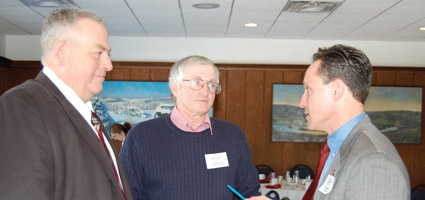Mandate relief, state aid top school board concerns
COVENTRY – The impact of the proposed tax cap, the need for mandate relief and inequalities in the formula used to calculate state aid topped the list of concerns local school leaders shared with elected officials on Saturday at a Legislative Breakfast co-sponsored by DCMO BOCES and the Chenango County School Board Association.
The event, held annually at The Silo Restaurant in Coventry, drew administrators and school board members from each of Chenango County’s nine school systems and others throughout the DCMO BOCES district. There to field questions and hear concerns were Senator James Seward and Assemblyman Pete Lopez, as well as a representative from Senator Tom Libous’ office and Assemblyman Cliff Crouch, who made a brief appearance.
Seward and Lopez sympathized with the concerns of school leaders about proposals for a property tax cap, which schools fear will threaten their ability to continue providing a quality education to students at a time when they face losses in state and federal aid and rising heath care and pension contribution costs.
The key, according to both legislators, is making sure any tax cap includes meaningful mandate relief to help schools cut costs.
“We have to attack the expenditure side of the equation,” Seward said. “Everything has to be out on the table.”







Comments